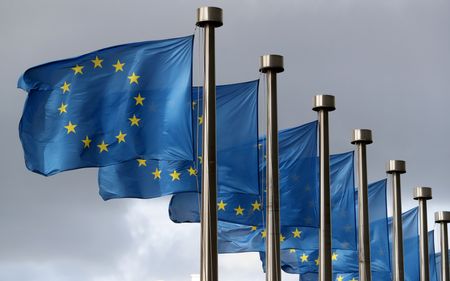By Kate Abnett
BRUSSELS (Reuters) -European Union leaders want a revision clause in the bloc’s new climate change target, potentially allowing them to weaken it in future, draft conclusions for a summit on Thursday showed.
Government leaders will meet for what diplomats expect to be a heated debate on the EU’s new climate target for 2040, which has stoked concerns in some capitals over how to fund the low-carbon transition alongside priorities like defence and revitalising local industries.
Draft conclusions for the meeting, seen by Reuters, said leaders would agree for EU countries and lawmakers to proceed in setting the 2040 climate goal. But they also set out conditions for doing this.
These included “the need for a revision clause, in light of latest scientific evidence, technological advances, and evolving challenges to the EU’s global competitiveness,” said the draft, which could still change before leaders approve it on Thursday.
Countries including Poland have argued a revision clause is needed in case green technologies don’t develop as planned, or economic conditions mean countries fail to make the investments needed to achieve the climate target.
The move also reflects concerns among countries such as France and Latvia that forests and agricultural lands will struggle to absorb enough CO2 emissions to comply with the goal – in part, because of wildfires made worse by climate change.
The EU Commission has said the 2040 target should be to slash net emissions by 90%, compared with 1990 levels – a goal that would rank among the most ambitious of any major economy.
The Commission has said sticking to ambitious climate targets is vital to ensure European industries can evolve to compete with China’s dominance in green technologies, and to protect countries from costly extreme weather.
But it has also proposed weakening some EU green laws, including the EU’s corporate sustainability law and an upcoming carbon pricing system for transport and heating fuels, in an attempt to contain the pushback from some governments seeking to roll back climate measures.
The draft leaders’ conclusions also asked the European Commission to develop more “enabling conditions” – which could mean policy changes or funding – to support industries and citizens in meeting climate goals.
(Reporting by Kate Abnett and Andrew Gray; Editing by Andrea Ricci)










